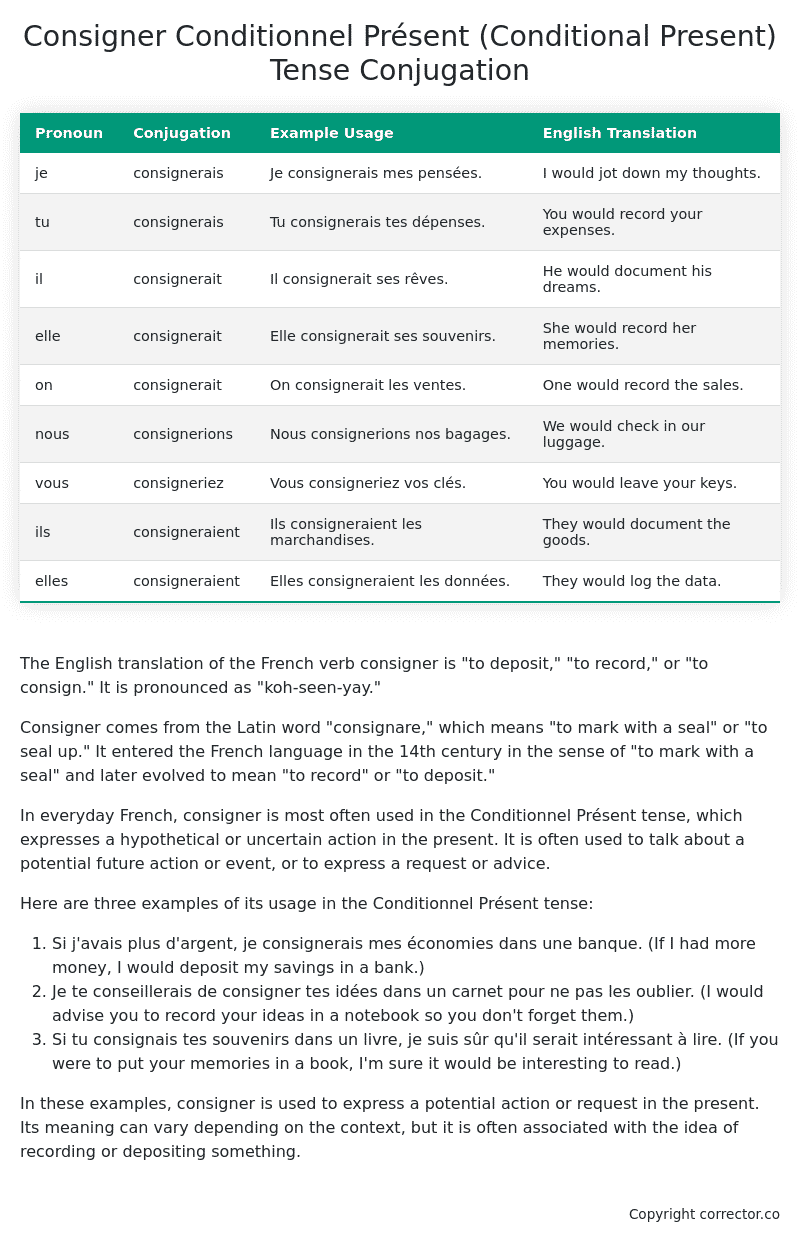Conditionnel Présent (Conditional Present) Tense Conjugation of the French Verb consigner
Introduction to the verb consigner
The English translation of the French verb consigner is “to deposit,” “to record,” or “to consign.” It is pronounced as “koh-seen-yay.”
Consigner comes from the Latin word “consignare,” which means “to mark with a seal” or “to seal up.” It entered the French language in the 14th century in the sense of “to mark with a seal” and later evolved to mean “to record” or “to deposit.”
In everyday French, consigner is most often used in the Conditionnel Présent tense, which expresses a hypothetical or uncertain action in the present. It is often used to talk about a potential future action or event, or to express a request or advice.
Here are three examples of its usage in the Conditionnel Présent tense:
- Si j’avais plus d’argent, je consignerais mes économies dans une banque. (If I had more money, I would deposit my savings in a bank.)
- Je te conseillerais de consigner tes idées dans un carnet pour ne pas les oublier. (I would advise you to record your ideas in a notebook so you don’t forget them.)
- Si tu consignais tes souvenirs dans un livre, je suis sûr qu’il serait intéressant à lire. (If you were to put your memories in a book, I’m sure it would be interesting to read.)
In these examples, consigner is used to express a potential action or request in the present. Its meaning can vary depending on the context, but it is often associated with the idea of recording or depositing something.
Table of the Conditionnel Présent (Conditional Present) Tense Conjugation of consigner
| Pronoun | Conjugation | Example Usage | English Translation |
|---|---|---|---|
| je | consignerais | Je consignerais mes pensées. | I would jot down my thoughts. |
| tu | consignerais | Tu consignerais tes dépenses. | You would record your expenses. |
| il | consignerait | Il consignerait ses rêves. | He would document his dreams. |
| elle | consignerait | Elle consignerait ses souvenirs. | She would record her memories. |
| on | consignerait | On consignerait les ventes. | One would record the sales. |
| nous | consignerions | Nous consignerions nos bagages. | We would check in our luggage. |
| vous | consigneriez | Vous consigneriez vos clés. | You would leave your keys. |
| ils | consigneraient | Ils consigneraient les marchandises. | They would document the goods. |
| elles | consigneraient | Elles consigneraient les données. | They would log the data. |
Other Conjugations for Consigner.
Le Present (Present Tense) Conjugation of the French Verb consigner
Imparfait (Imperfect) Tense Conjugation of the French Verb consigner
Passé Simple (Simple Past) Tense Conjugation of the French Verb consigner
Passé Composé (Present Perfect) Tense Conjugation of the French Verb consigner
Futur Simple (Simple Future) Tense Conjugation of the French Verb consigner
Futur Proche (Near Future) Tense Conjugation of the French Verb consigner
Plus-que-parfait (Pluperfect) Tense Conjugation of the French Verb consigner
Passé Antérieur (Past Anterior) Tense Conjugation of the French Verb consigner
Futur Antérieur (Future Anterior) Tense Conjugation of the French Verb consigner
Subjonctif Présent (Subjunctive Present) Tense Conjugation of the French Verb consigner
Subjonctif Passé (Subjunctive Past) Tense Conjugation of the French Verb consigner
Subjonctif Imparfait (Subjunctive Imperfect) Tense Conjugation of the French Verb consigner
Subjonctif Plus-que-parfait (Subjunctive Pluperfect) Tense Conjugation of the French Verb consigner
Conditionnel Présent (Conditional Present) Tense Conjugation of the French Verb consigner (this article)
Conditionnel Passé (Conditional Past) Tense Conjugation of the French Verb consigner
L’impératif Présent (Imperative Present) Tense Conjugation of the French Verb consigner
L’infinitif Présent (Infinitive Present) Tense Conjugation of the French Verb consigner
Struggling with French verbs or the language in general? Why not use our free French Grammar Checker – no registration required!
Get a FREE Download Study Sheet of this Conjugation 🔥
Simply right click the image below, click “save image” and get your free reference for the consigner Conditionnel Présent tense conjugation!

Consigner – About the French Conditionnel Présent (Conditional Present) Tense
Formation
Common Everyday Usage Patterns
Expressing Polite Requests
Expressing Hypothetical Situations
Expressing Doubt or Uncertainty
Interactions with Other Tenses
Present Tense
Past Tense
Future Tense
Conditional Perfect
Summary
Want More?
I hope you enjoyed this article on the verb consigner. Still in a learning mood? Check out another TOTALLY random French verb conjugation!


